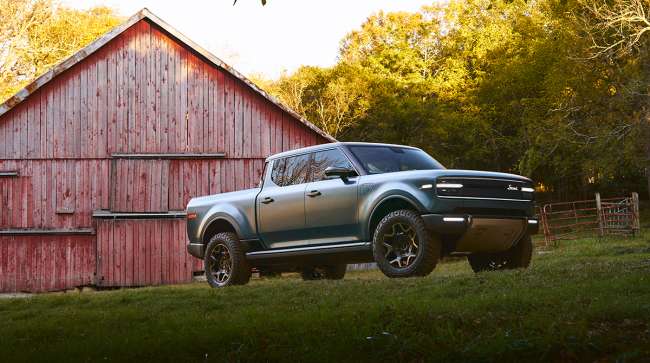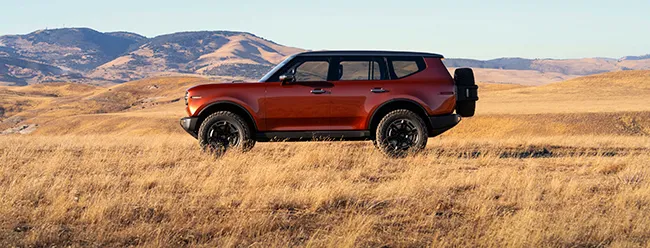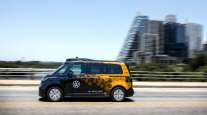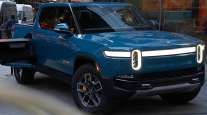VW’s Scout Motors Adds New Hybrid Models

[Stay on top of transportation news: Get TTNews in your inbox.]
Volkswagen AG’s forthcoming Scout line of battery-powered sport utility vehicles and pickup trucks is adding gasoline-fueled internal combustion engines to the mix.
Scout Motors, VW’s big bid to finally become a significant player in the U.S. auto market, will offer its new Traveler SUV and Terra pickup in plug-in hybrid versions in addition to battery-only configurations. The gas-electric models will feature a combustion engine to automatically recharge the battery as the vehicle rolls down the road, the company said at a splashy ceremony to reveal the concept vehicles near Nashville on Oct. 24.
The shift marks a hedge by VW since it announced plans in 2022 to revive and electrify the classic American Scout brand that was last sold 44 years ago. EV sales growth has since slowed, with mainstream buyers resisting their high prices and a spotty infrastructure of charging stations.
Several automakers, including VW, have delayed and canceled EV models in response to the slowdown. Adding a range-extended electric vehicle option, or EREV, is a move to tackle those challenges and help VW become a more relevant player in the U.S. as it contends with challenges at home and abroad.

Scout Motors' Traveler SUV. (Scout Motors)
“We have only 4% market share in the U.S.,” Arno Antlitz, VW Group’s chief financial officer, said in an interview. “Going forward, to become more robust, become even more profitable, we need to grow in the U.S..”
Although not yet available in the U.S., EREVs have become the fastest growing propulsion system in China, the world’s largest EV market. They’re prized for long driving ranges and lower costs than battery-only EVs.
Chrysler parent Stellantis NV plans to begin selling its EREV Ramcharger pickup truck next year. Ford Motor Co. has also said it is considering the technology.
Scout began incorporating the optional EREV into its model lineup about nine months ago, said Scott Keogh, Scout’s CEO.
“Why did we do this? We listened,” he said in an interview.

Keough
Keogh said Scout’s EREV variants should “absolutely” resolve worries would-be EV buyers have about running out of juice on long drives, known as range anxiety. They’ll also be cheaper than their pure-electric counterparts, he said, because they’ll run on a smaller battery, the most expensive part of an EV.
Scout said its extended-range models will be capable of driving more than 500 miles before refueling, compared with a 350-mile range on the pure-electric variants. The gas engine does not propel the wheels, but only acts as an on-board generator to recharge the vehicle’s battery.
The Traveler and Terra will arrive in 2027 and be priced starting around $60,000, the company said. When government EV incentives are factored in, the cost will fall closer to $50,000, it said.
Keogh did not give prices for the gas-electric versions, which will be branded “Harvester.” He also wouldn’t reveal a sales target for Scout or its EREV business, though Scout expects the SUV will account for two-thirds of total sales.
The “Harvester” name is a nod to Scout’s original owner, International Harvester, which built the brand’s SUVs and trucks from 1960 to 1980.
VW acquired the Scout brand when it purchased Navistar, the successor company to International Harvester, in a deal that closed in 2021. A year later, VW said it would revive the Scout brand as a line of EVs in a bid to finally make a dent in the U.S. market that has foiled the German automaker for decades.
McLeod Software CEO Tom McLeod explores the potential for artificial intelligence to boost efficiency and build resilience. Tune in above or by going to RoadSigns.ttnews.com.
The idea is to take on American SUV stalwarts like the Jeep Wrangler and the Ford Bronco with a reimagined Scout line designed in the U.S. and built at a $2 billion factory under construction in South Carolina.
The Terra pickup is a full-sized truck that goes after the electric versions of the Ford F-150, General Motors Co.’s Chevrolet Silverado and Rivian Automotive Inc.’s R1T.
“This goes right into where 40% of the profit pools are in the U.S.,” Keogh said. “And these are the biggest single profit pools in the total global car market.”
Keogh said Scout will turn a profit on an operating basis in its first full year, thanks to the economies of scale and parts buying power its parent VW gives it.
“We’ll be profitable on car number one,” Keogh said, noting that’s on a “contribution margin” basis and doesn’t include the billions in startup costs.
Scout also may adopt some technology from VW’s new joint venture with American electric startup Rivian, Keogh said. VW announced it June it is investing as much as $5 billion into Rivian to jointly develop battery-powered vehicles and software.
Want more news? Listen to today's daily briefing above or go here for more info
“There’s the possibility that that joint venture software could work its way into a Scout, absolutely,” Keogh said, adding that Scout hasn’t had any conversations with Rivian. VW’s big bet in the U.S. comes as the automaker is struggling at home and in China, its two largest markets, and is considering unprecedented factory closings in Germany. Labor union representatives, who sit on VW’s supervisory board, and German government officials have vowed to fight any plant shutdowns.
Keogh contends VW needs its American operations to finally deliver, given its struggles elsewhere.
“The VW Group needs to get stronger in America to balance all of the challenges,” Keogh said. “And with so much happening geopolitically, let’s say it’s critical to have a stronger footprint in America.”
Scout began taking orders on the new models Oct. 24 and will sell them directly to consumers, rather than through dealers.





